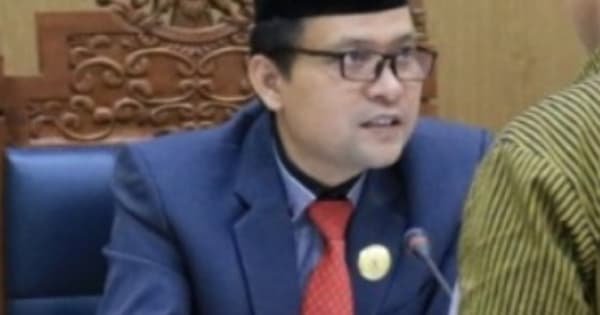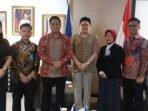By: Hendra J Kede *)
Preliminary
The Information Commission, besides continuing to hold Monitoring and Evaluation (Monev) of Public Information Openness, starting in 2021 will also carry out a series of activities to find the Public Information Openness Index (IKIP). The IKIP concept design is nearing to the final process.
Monitoring and Evaluation of Public Information Disclosure
The Information Commission at all levels annually organizes Monitoring and Evaluation (Monev) of State Public Bodies.
Monev is carried out to assess the extent to which State Public Bodies (Executive, Legislative, Judiciary, Political Parties, BUMN, Local Government, BUMD, and Higher Education) have implemented and obeyed the principles of open public information as outlined in Law Number 14 of 2008 concerning Openness of Public Information. (Law 14/2008).
The peak of the Monev program is usually held at the Presidential Palace or the Vice President’s Palace. More often at the Vice President’s Palace
Initially Monev was carried out in the form of a competition for get the ranking. Each State Public Agency is grouped in a certain grouping. During the Monev conducted by the Central Information Commission, Public Bodies are divided into several groups: Ministries, Non-Ministerial Institutions, Non-Structural Institutions, BUMN, Political Parties, Provincial Governments, Universities, and Higher Education. In each group will be competition to be ranked first.
No matter what value is obtained, the State Public Agency with the highest score in its group will be assigned the first rank. And so on until rank ten. The first rank in a group does not have to be the same qualification, quality or quantity of value with other groups.
Starting in 2018, the grouping of State Public Bodies in Monev at the central level has not changed but there are differences in the scoring system. Monev is no longer to rank State Public Bodies. Ranking changed to qualification.
There are five levels of qualification: starting from the highest qualification namely Informative, Toward Informative, Fairly Informative, Less Informative, and the lowest qualification Non-Informative.
All Public Bodies have the same opportunity to achieve the highest qualification, informative, and did not limited to the number of Public Bodies that can qualify. As long as it meets the stipulated standards, whatever number of Public Bodies can reach the highest.
This model also does not require that a Public Agency be included in a specific qualification for each group of Public Bodies. If no one meets the Informative qualification in a group, it means that no one will get the Informative predicate in that group. This model also has an impact on the same standardized qualification for all groups.
The central level Monev is ongoing. From Monday (5/9) to Thursday (8/9) each State Public Agency will deliver virtual presentations in front of the Appraisal Panel consisting of the Commissioner of the Central Information Commission and experts and figures. This presentation was held after the State Public Agency completed the Self-Assessment Questionnaire (SAQ) and tracking the SAQ.
The SAQ score that has been tracked and the value of the interview will determine the final score of the Public Agency. If the score is 90 and above, it means that the Public Agency has the highest qualification: Informative.
A score of 80 to <90 is included in the qualification Towards Informative, a value of 60 to <80 is in the Qualification of Sufficiently Informative, a value of 40 to <60 is classified as Less Informative, and Not Informative like a Public Agency whose score is below 40.
Of course there are many questions that are often asked by public bodies at moments like this, such as whether the assessment instrument is exactly the same as the previous year?
Public Information Disclosure Index
In the middle of the 2017-2021 Central Information Commission period, a brilliant idea emerged from the Commissioner for Research and Documentation, Romanus Ndau: the importance of the Public Information Openness Index (IKIP).
Isn’t the disclosure of public information not merely about the compliance of Public Bodies, especially the State Punlik, in implementing Law 14/2008 but also the extent to which the implementation of all legal principles and norms of public information disclosure has lived and colored the daily life of public bodies and society.
To what extent has an informative community culture been formed and it has become an integral part of the daily life of all Public Bodies and Indonesian society, in the context of realizing a just and prosperous society.
To what extent has the contribution of Article 28F of the NRI Constitution and its derivative regulations (eg Law 14/2008) in realizing the goals of the state as outlined by the Constitution, that is the welfare of all Indonesian people.
And another question concerning the implementation of the Public Information Openness Regime in Indonesia since Amendment II of the 1945 Constitution of the Republic of Indonesia which anchors Article 28F to all aspects of national and state life. Questions that are not only addressed to State Public Bodies regarding their compliance in implementing Law 14/2008.
If Monev is to assess the compliance of Public Bodies, then IKIP is to capture how the implementation and impact of public information disclosure in an area as much as possible photographing all matters relating to issues and outcames for the implementation of public information disclosure.
If Monev is to see the compliance of Public Bodies in implementing Law 14/2008 in the current year, IKIP will take pictures of the previous year. The implementation of the IKP in 2020 is to capture the dimensions, variables, dimensions of public information openness in the period 1 January -31 December 2020.
The IKIP’s concept is in the process of being finalized. It is planned that there will be 3 (three) Dimensions, 20 (twenty) Variables, and 77 (seventy seven) Indicators with at least 77 (seventy seven) Questionnaires.
Each province is planned to have a separate Worker Body (or other designation later) and Expert Panel (or other designation later), as well as the national level. The number of Worker Bodies and Expert Panels is planned proportionally depending on the size of the administrative area of the government and the population in each Province. Both the Working Body and the Expert Panel are in the range of 5 (five) to 15 (fifteen) people.
At the beginning of 2021, it is hoped that the IKIP process will start to run to capture issues and outcames of public information disclosure in 34 (thirty four) provinces and National The Worker Agency will begin collecting data in 34 provinces and nationally according to the questionnaire. Furthermore, the Worker Body processes it as material to be presented to the Expert Panel. It is the Ahlilah Panel that will determine the final index score for each Province and national.
It is hoped that in May 2021 the Public Information Openness Index for each province and nationally will be released because it is planned that the index value will be part of and included in the Country Report which the Minister of Foreign Affairs will submit to the UN in Geneva, Switzerland in May. And it will also be reported to the President around June 2021 as one of the introductory materials for the State Budget in a State Speech on August 16, 2021.
Interestingly, the three dimensions, twenty variables, seventy seven indicators, and at least seventy seven questionnaires are designed not to change at least for the next 5 (five) years. It is intended that the results of the IKIP can be followed up and used as a basis for making improvements to the application of public information disclosure.
So the IKIP value in next year can be compared with the previous year’s IKIP value. Thus it can be photographed whether there has been a change for the better or towards more labor or is stagnant with the same standard of assessment.
Closing
That is a brief explanation of Monev and the plan for the Public Information Openness Index (IKIP). Hopefully useful, aamiin.
*) Deputy Chairman of the Indonesian Central Information Commission











